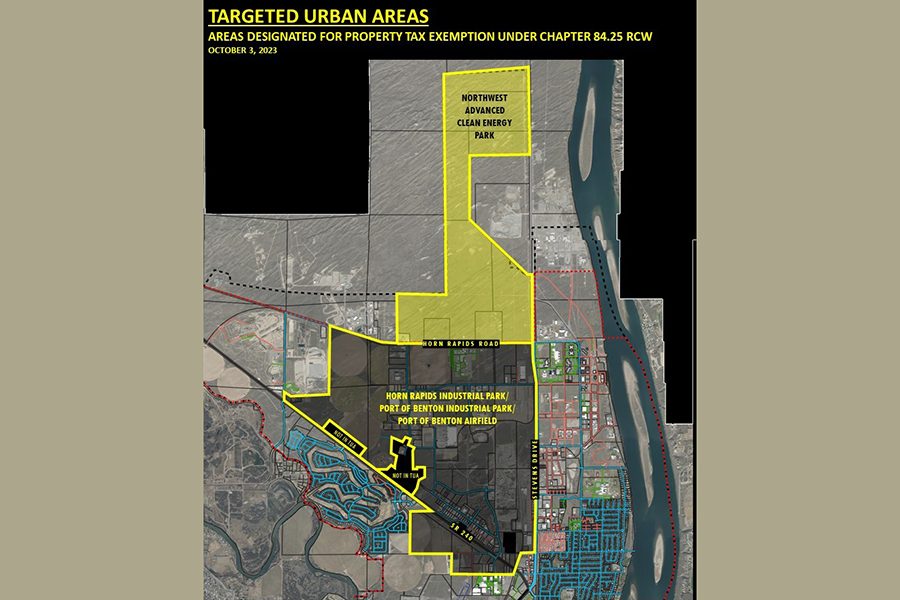
Home » Richland tax incentive begins to spur economic development
Richland tax incentive begins to spur economic development

This map shows the boundaries of the city of Richland's Targeted Urban Area, or TUA.
Courtesy city of RichlandFebruary 14, 2024
Richland has available industrial land, a robust and skilled workforce, and other factors that make it attractive to companies looking to expand their operations or build something new within city limits.
But until recently, it couldn’t offer the kind of incentives that communities in some other states — from California to Tennessee — use to entice manufacturers and bring in jobs and revenue.
That’s changed now thanks to the Targeted Urban Area, or TUA, program.
The program was adopted by the state Legislature in 2022, and Richland established its TUA last year — the first city in Washington to do so. So far, the TUA has been an effective economic development tool, with three industrial expansion projects in the works or in the pipeline so far, officials said.
“The program offers a lot of benefits to the community,” said Mandy Wallner, Richland’s economic development manager. “We’re gaining a lot of jobs and a lot of impact.”
Karl Dye, president and chief executive officer of the Tri-City Development Council, or TRIDEC, agreed.
"This makes us competitive with other states. For economic development, it’s a game-changer," he said.
The concept is simple: manufacturers that build or expand within a targeted area get a break on city property taxes on new improvements for 10 years. Their projects must meet certain criteria, including that they’re valued at $800,000 or more and create at least 25 family living wage jobs.
The tax break kicks in when construction is done.
Richland officials so far have approved three projects through the TUA program: the expansion of the ATI Inc. plant on Kingsgate Way and the planned two-phase expansion of the Framatome site on Horn Rapids Road. The city property tax to be waived for the three projects is estimated at about $8.9 million total over 10 years.
But, Wallner said, the benefits those projects bring to the city will more than make up for that.
The projects are forecast to bring in more than 900 jobs, directly or indirectly, and to generate more than $19 million in local, state and federal tax revenue, according to data from the city.
For companies, “(the program) really changes the financial piece for them and makes it worthwhile to be here. We’re seeing that as a huge win,” Wallner told the Journal of Business.
Projects in the pipeline
The ATI expansion kicked off last year.
The plant, which was commissioned in 1998, specializes in melting titanium and titanium alloys for aerospace, defense and industrial markets. A second furnace and vacuum arc remelting capability are being added, helping the Dallas-based ATI support $1.2 billion in new sales commitments.
The expansion will add about 100 jobs, ATI officials have said.
Meanwhile, Framatome’s TUA applications were approved in January.
The nuclear energy company is preparing to expand its nuclear fuel manufacturing operation in Richland. The expansion is crucial to meeting future energy needs and supporting industry decarbonization strategies, the company said in a statement.
Combined, the two phases are planned to add more than 200 new jobs and cost about $370 million.
Preliminary work for Phase 1 – a prototype manufacturing line to build TRISO fuel particles for the Ultra Safe Nuclear Corporation’s Micro Modular Reactor – is happening now.
Framatome officials said the TUA program is a great way to incentivize manufacturing growth and expansion.
“Framatome is committed to the future of the nuclear energy industry and the TUA has made it possible for future opportunities for growth as we develop fuel for the next generation of nuclear power reactors,” said Lance Stephens, Richland site manager, in a statement.
“The city of Richland’s support for nuclear energy as a reliable, clean energy source positions Washington as a leader in the transition to America’s clean energy future and reinforces our commitment to further investment in our workforce and facilities,” he said.
Richland’s TUA
In terms of geography, Richland’s TUA includes the Northwest Advanced Clean Energy Park, the Horn Rapids Industrial Park and land around the Richland Airport.
Benton County also has created a TUA covering similar territory.
Some other future projects could be eligible for the program, including Atlas Agro’s proposed $1 billion fertilizer plant and Cenate’s proposed lithium-ion battery component plant.
Cenate also is considering Butte, Montana, as its location.
Dye, from TRIDEC, said early discussion with Atlas Agro put into sharp relief how incentives can pull away or draw in companies looking to expand or build. Richland was able to act quickly after the state legislature adopted the TUA program, and projects – and their benefits – are coming in.
"The TUA provides local control – cities have the choice to adopt it, and they have the ability to approve or not each application that comes in. From a policy view, it's really the best case of the 'but for' scenario, meaning 'but for this incentive, the project wouldn't happen,'" Dye said.
Wallner agreed.
“A company (may be willing) to pay a little bit more to come here than they would say, North Carolina, if we’re more attractive and have a better workforce and so on. But when you’re a billion dollars apart or several million dollars apart, it’s really hard to bridge the gap with just conversation until you have a program like this,” she said. “We see the benefit in being progressive.”
Latest News Real Estate & Construction Local News Commercial Real Estate Manufacturing Taxes
KEYWORDS February 2024
Related Articles




